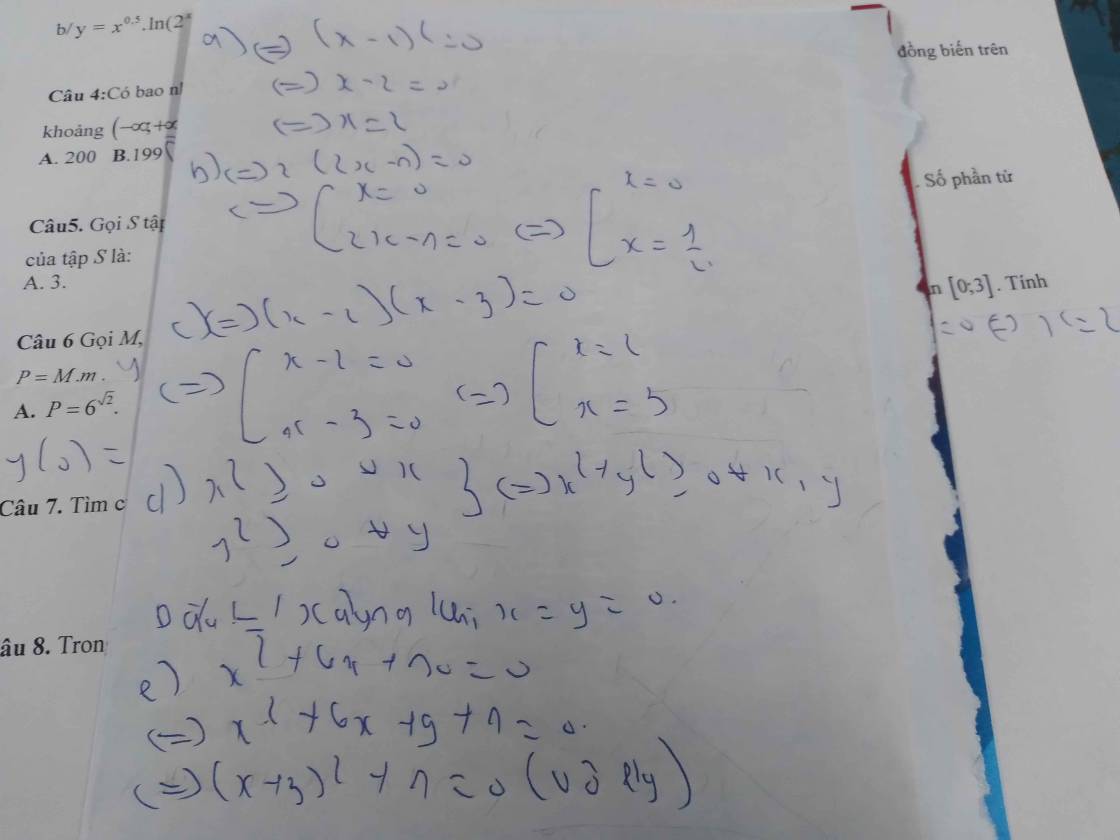C = 2x2 - 4x + 6 > 0

Những câu hỏi liên quan
Kết quả rút gọn biểu thức (x + 2)(x + 3) + (x – 1)2
A.2x2 + 4x + 7.
B.2x2 + 3x + 6.
C.2x2 + 4x + 6.
D.2x2 + 3x + 7.
Giải các phương trình sau:a)
5
−
2
x
2
+
4
x
−
10
8
;
b)
x
2
+
2
x
+
3
x
2...
Đọc tiếp
Giải các phương trình sau:
a) 5 − 2 x 2 + 4 x − 10 = 8 ;
b) x 2 + 2 x + 3 x 2 + 2 x + 1 = 3 ;
c) x x − 1 x 2 − x + 1 − 6 = 0 .
Tìm x:
a, x(2x – 3) – 2(3 – 2x) = 0
b, (x – 3)(x2 + 3x + 9) – x(x + 2)(x – 2) = 1
c, 4x2 + 4x – 6 = 2
d, 2x2 + 7x + 3 = 0
\(a,\Leftrightarrow\left(2x-3\right)\left(x+2\right)=0\Leftrightarrow\left[{}\begin{matrix}x=\dfrac{3}{2}\\x=-2\end{matrix}\right.\\ b,\Leftrightarrow x^3-27-x^3+4x=1\\ \Leftrightarrow4x=28\Leftrightarrow x=7\\ c,\Leftrightarrow4x^2-4x-8=0\\ \Leftrightarrow x^2-x-2=0\\ \Leftrightarrow\left(x-2\right)\left(x+1\right)=0\Leftrightarrow\left[{}\begin{matrix}x=2\\x=-1\end{matrix}\right.\\ d,\Leftrightarrow2x^2+6x+x+3=0\\ \Leftrightarrow\left(x+3\right)\left(2x+1\right)=0\Leftrightarrow\left[{}\begin{matrix}x=-3\\x=-\dfrac{1}{2}\end{matrix}\right.\)
Đúng 3
Bình luận (0)
Câu 1. Sử dụng máy tính để định hướng cách phân tích các đa thức sau thành nhân tử
A = x2 + 4x - 5
B = -x2 + 4x +5
C = 2x2 + 5x - 3
D = -2x2 + 5x - 3
E = -2x2 + 7x - 6
F = 2x2 - 7x +6
G = 2x2 + 7x +5
H = 2x2 - x - 6
casio fx 570 thì ấn mode => 5 => 3 sau điền hệ số a;b;c
casio fx 580 thì ấn mode => 9 => 2 => 2 => điền hệ số a;b;c
có cả cách này à =)))
menu setup -> 9 -> 2 - > 2 (pt cần phân tích) -> nhập hệ số của pt vào từng biến thích hợp -> ''=''
VD : \(A=x^2+4x-5\)có nghiệm \(x_1=1;x_2=-5\)
vậy đa thức cần phân tích là : \(\left(x-1\right)\left(x+5\right)=x^2+5x-x-5\)
Vậy \(A=x^2+4x-5=x^2+5x-x-5=\left(x-1\right)\left(x+5\right)\)
tương tự nhé
cùng vị trí nên tao lộn thôi =))
Bài 7: Giải phương trình : a)( x- 2x + 3 ) ( 2x - x+6 ) =18
b) 3x3 + 6x2 –4x = 0
c) 3x2 – 5x = 0
d) – 2x2 + 8 = 0
a: \(\Leftrightarrow\left(-x+3\right)\left(x+6\right)=18\)
\(\Leftrightarrow-x^2-6x+3x+18-18=0\)
\(\Leftrightarrow-x\left(x+3\right)=0\)
=>x=0 hoặc x=-3
b: \(\Leftrightarrow x\left(3x^2+6x-4\right)=0\)
\(\Leftrightarrow\left[{}\begin{matrix}x=0\\3x^2+6x-4=0\end{matrix}\right.\Leftrightarrow\left[{}\begin{matrix}x=0\\x^2+2x-\dfrac{4}{3}=0\end{matrix}\right.\)
\(\Leftrightarrow\left[{}\begin{matrix}x=0\\\left(x+1\right)^2=\dfrac{7}{3}\end{matrix}\right.\Leftrightarrow x\in\left\{0;\dfrac{\sqrt{21}}{3}-1;\dfrac{-\sqrt{21}}{3}-1\right\}\)
c: =>x(3x-5)=0
=>x=0 hoặc x=5/3
d: =>(x-2)(x+2)=0
=>x=2 hoặc x=-2
Đúng 0
Bình luận (0)
b. 4x2 +4x+1=0 d. 5x2 6x1=0 a. 2x2-5x+1=0 c. -3x2 +2x+8=0 e. -3x2+ 14x - 8=0 g. -7x2 +4x-3=0
a. 2x2-5x+1=0
△= b2 - 4ac = (-5)2 - 4*2*1 = 17 ⇒√△ = √17
\(\Rightarrow x_1=\frac{5+\sqrt{17}}{4};x_2=\frac{5-\sqrt{17}}{4}\)
Vậy .... S={\(\frac{5\pm\sqrt{17}}{4}\)}
b. 4x2 +4x+1=0
⇔(2x+1)2 = 0 ⇔ x=\(\frac{-1}{2}\)
c. -3x2 +2x+8=0
△' = b'2 - ac = 12 - (-3)*8 = 25 ⇒√△ = 5
\(\Rightarrow x_1=\frac{-1+5}{-3}=-\frac{4}{3};x_2=\frac{-1-5}{-3}=2\)
Vậy... S={-\(\frac{4}{3}\);2}
d. 5x2 6x1=0 (thiếu dấu nên mk chưa giải được)
e. -3x2+ 14x - 8=0
△' = b'2 - ac = 72 - (-3)*(-8) = 25 ⇒ √△ = 5
⇒\(x_1=\frac{-7+5}{-3}=\frac{2}{3};x_2=\frac{-7-5}{-3}=4\)
Vậy .... S={\(\frac{2}{3};4\)}
g. -7x2 +4x-3=0
△' = b'2 - ac = 22 - (-7)*(-3) = -17<0
Vậy pt vô nghiệm , S=∅
Đúng 0
Bình luận (4)
giúp mình giải bài này với
giải phương trình
a) ( x2-2x+1)- 4 = 0(x2-2x+1)-4=0
b) x2-x= -2x+2x2-x=-2x+2
c) 4x2+4x+1= x24x2+4x+1= x2
d)x2-5x+6= 0x2-5x+6=0
\(a.\left(x^2-2x+1\right)-4=0\\\Leftrightarrow \left(x-1\right)^2-2^2=0\\\Leftrightarrow \left(x-1-2\right)\left(x-1+2\right)=0\\ \Leftrightarrow\left(x-3\right)\left(x+1\right)=0\\\Leftrightarrow \left[{}\begin{matrix}x-3=0\\x+1=0\end{matrix}\right.\Rightarrow\left[{}\begin{matrix}x=3\\x=-1\end{matrix}\right.\)
Vậy tập nghiệm của phương trình trên là \(S=\left\{3;-1\right\}\)
\(b.x^2-x=-2x+2\\\Leftrightarrow x^2-x+2x-2=0\\\Leftrightarrow x\left(x-1\right)+2\left(x-1\right)=0\\\Leftrightarrow \left(x+2\right)\left(x-1\right)=0\\\Leftrightarrow \left[{}\begin{matrix}x+2=0\\x-1=0\end{matrix}\right.\Rightarrow\left[{}\begin{matrix}x=-2\\x=1\end{matrix}\right.\)
Vậy tập nghiệm của phương trình trên là \(S=\left\{-2;1\right\}\)
\(c.4x^2+4x+1=x^2\\ \Leftrightarrow4\left(x^2+x+\frac{1}{4}\right)-x^2=0\\ \Leftrightarrow4\left(x+\frac{1}{2}\right)^2-x^2=0\\ \Leftrightarrow\left[2\left(x+\frac{1}{2}\right)-x\right]\left[2\left(x-\frac{1}{2}\right)+x\right]=0\\ \Leftrightarrow\left[{}\begin{matrix}2\left(x+\frac{1}{2}\right)-x=0\\2\left(x+\frac{1}{2}\right)+x=0\end{matrix}\right.\Rightarrow\left[{}\begin{matrix}2x+1-x=0\\2x+1+x=0\end{matrix}\right.\Rightarrow\left[{}\begin{matrix}x=-1\\x=-\frac{1}{3}\end{matrix}\right.\)
Vậy tập nghiệm của phương trình trên là \(S=\left\{-1;-\frac{1}{3}\right\}\)
\(d.x^2-5x+6=0\\ \Leftrightarrow x^2-2x-3x+6=0\\\Leftrightarrow x\left(x-2\right)-3\left(x-2\right)=0\\ \Leftrightarrow\left(x-3\right)\left(x-2\right)=0\\\Leftrightarrow \left[{}\begin{matrix}x-2=0\\x-3=0\end{matrix}\right.\Rightarrow\left[{}\begin{matrix}x=2\\x=3\end{matrix}\right.\)
Vậy tập nghiệm của phương trình trên là \(S=\left\{2;3\right\}\)
Xem thêm câu trả lời
Giải phương trình:
a)x2-4x+4=0
b)2x2-x=0
c)x2-5x+6=0
d)x2+y2=0
e)x2+6x+10=0
\(a.x^2-4x+4=0\)
\(\left(x-2\right)^2=0\)
=>x=2
b) \(2x^2-x=0\)
\(x\left(2x-1\right)=0\)
=> \(\left[{}\begin{matrix}x=0\\x=\dfrac{1}{2}\end{matrix}\right.\)
c) \(x^2-5x+6=0\)
\(x^2-2x-3x+6=0\)
\(\left(x-2\right)\left(x-3\right)=0\)
=> \(\left[{}\begin{matrix}x=2\\x=3\end{matrix}\right.\)
d) \(x^2+y^2=0\)
Vì \(x^2,y^2\ge0\forall x,y\)
=>x=y=0
e) \(x^2+6x+10=0\)
\(\left(x+3\right)^2+1=0\)
Vì \(\left(x+3\right)^2\ge0\forall x\)
=> VT>0 \(\forall x\)
=> phương trình vô nghiệm
Đúng 3
Bình luận (0)
a) \(x^2-4x+4=0\)
\(\Leftrightarrow\left(x-2\right)^2=0\)
\(\Leftrightarrow x-2=0\)
\(\Leftrightarrow x=2\)
b) \(2x^2-x=0\)
\(\Leftrightarrow x\left(2x-1\right)=0\)
\(\Leftrightarrow\left[{}\begin{matrix}x=0\\2x-1=0\end{matrix}\right.\) \(\Leftrightarrow\left[{}\begin{matrix}x=0\\x=\dfrac{1}{2}\end{matrix}\right.\)
c) \(x^2-5x+6=0\)
\(\Leftrightarrow\left[{}\begin{matrix}x=2\\x=3\end{matrix}\right.\) \(\left(a+b+c=0\right)\)
d) \(x^2+y^2=0\)
\(\Leftrightarrow\left\{{}\begin{matrix}x^2=0\\y^2=0\end{matrix}\right.\) \(\Leftrightarrow\left\{{}\begin{matrix}x=0\\y=0\end{matrix}\right.\)
e) \(x^2+6x+10=0\)
\(\Leftrightarrow x^2+6x+9+1=0\)
\(\Leftrightarrow\left(x+3\right)^2+1=0\left(1\right)\)
mà \(\left(x+3\right)^2+1\ge1>0,\forall x\in R\)
Nên phương trình (1) vô nghiệm
Đúng 0
Bình luận (0)
Giải phương trình bằng cách đưa về phương trình tích :
3x2 + 2x - 1 = 0
x2 - 5x + 6 = 0
3x2 + 7x + 2 = 0
x2 - 4x + 1 = 0
2x2 - 6x + 1 = 0
3x2 + 4x - 4 = 0
3x2 + 2x - 1 = 0
=> 3x2 + 3x - x - 1 = 0
=> 3x(x + 1) - (x + 1) = 0
=> (3x - 1)(x + 1) = 0
=> \(\orbr{\begin{cases}3x-1=0\\x+1=0\end{cases}}\)
=> \(\orbr{\begin{cases}x=\frac{1}{3}\\x=-1\end{cases}}\)
x2 - 5x + 6 = 0
=> x2 - 2x - 3x + 6 = 0
=> x(x - 2) - 3(x - 2) = 0
=> (x - 3)(x - 2) = 0
=> \(\orbr{\begin{cases}x-3=0\\x-2=0\end{cases}}\)
=> \(\orbr{\begin{cases}x=3\\x=2\end{cases}}\)
3x2 + 7x + 2 = 0
=> 3x2 + 6x + x + 2 = 0
=> 3x(x + 2) + (x + 2) = 0
=> (3x + 1)(x + 2) = 0
=> \(\orbr{\begin{cases}3x+1=0\\x+2=0\end{cases}}\)
=> \(\orbr{\begin{cases}x=-\frac{1}{3}\\x=-2\end{cases}}\)
Đúng 0
Bình luận (0)
1, \(3x^2+2x-1=0\Leftrightarrow3x^2+3x-x-1=0\)
\(\Leftrightarrow3x\left(x+1\right)-\left(x+1\right)=0\)
\(\Leftrightarrow\left(x+1\right)\left(3x-1\right)=0\)
\(\Leftrightarrow\orbr{\begin{cases}x+1=0\\3x-1=0\end{cases}\Leftrightarrow\orbr{\begin{cases}x=-1\\x=\frac{1}{3}\end{cases}}}\)
2, \(x^2-5x+6=0\Leftrightarrow x^2-2x-3x+6=0\)
\(\Leftrightarrow x\left(x-2\right)-3\left(x-2\right)=0\)
\(\Leftrightarrow\left(x-2\right)\left(x-3\right)=0\)
\(\Leftrightarrow\orbr{\begin{cases}x-2=0\\x-3=0\end{cases}\Leftrightarrow\orbr{\begin{cases}x=2\\x=3\end{cases}}}\)
3, \(3x^2+7x+2=0\Leftrightarrow3x^2+6x+x+2=0\)
\(\Leftrightarrow3x\left(x+2\right)+\left(x+2\right)=0\)
\(\Leftrightarrow\left(x+2\right)\left(3x+1\right)=0\)
\(\Leftrightarrow\orbr{\begin{cases}x+2=0\\3x+1=0\end{cases}\Leftrightarrow\orbr{\begin{cases}x=-2\\x=-\frac{1}{3}\end{cases}}}\)
Đúng 0
Bình luận (0)
\(x^2-4x+1=0\)
\(\Leftrightarrow\left(x^2-4x+4\right)=3\)
\(\Leftrightarrow\left(x-2\right)^2=3\)
\(\Leftrightarrow x=\sqrt{3}+2;x=2-\sqrt{3}\)
\(2x^2-6x+1=0\)
\(\Leftrightarrow4x^2-12x+2=0\)
\(\Leftrightarrow\left(2x-3\right)^2=7\)
\(\Leftrightarrow x=\frac{\sqrt{7}+3}{2};x=\frac{3-\sqrt{7}}{2}\)
\(3x^2+4x-4=0\)
\(\Leftrightarrow3x^2-2x+6x-4=0\)
\(\Leftrightarrow\left(x+2\right)\left(3x-2\right)=0\)
\(\Leftrightarrow x=-2;x=\frac{2}{3}\)
Đúng 0
Bình luận (0)






























